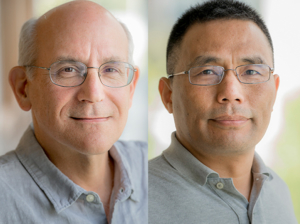
From left, Neil Segil and Qi-Long Ying (Photos by Chris Shinn)
Two USC Stem Cell scientists have received new research grants from the National Institutes of Health (NIH).
Neil Segil will use his $2.82 million grant to explore why humans and other mammals cannot recover from hearing loss, while birds and reptiles can. To understand this uniquely mammalian limitation, Segil’s team will focus on the regulatory processes that prevent genes from driving the replacement of new sensory hearing cells.
“Our goal is to identify the molecular obstacles to sensory hearing cell regeneration in the inner ear, as well as to discover ways to overcome those obstacles to stimulate regeneration and restore hearing in deafened individuals,” said Segil, who is a Professor of Research in the Department of Stem Cell Biology and Regenerative Medicine, and the USC Tina and Rick Caruso Department of Otolaryngology–Head and Neck Surgery at the Keck School of Medicine of USC.
Qi-Long Ying has received $1.32 million to investigate how two proteins, called GSK3 and ERK, influence whether stem cells self-renew to produce more stem cells, or differentiate into more specialized cell types. When the levels of either of these two proteins are out of wack, people can develop a wide range of diseases, including cancer, diabetes, Alzheimer’s disease, Parkinson’s disease and mood disorders.
“Our study will have important implications for regenerative medicine as well as for developing therapies for diseases caused by a dysfunction of GSK3 or ERK,” said Ying, a Professor of Stem Cell Biology and Regenerative Medicine, and Integrative Anatomical Sciences at the Keck School.
Andy McMahon, Chair of the Department of Stem Cell Biology and Regenerative Medicine, said, “I’m delighted that the NIH has chosen to support these important stem cell research projects.”
BY Cristy Lytal